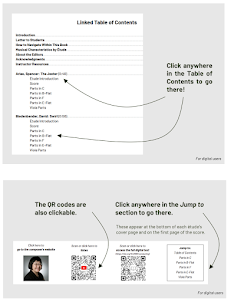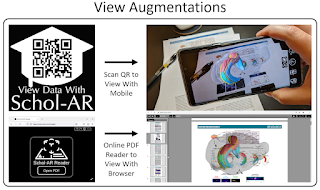This year, the judges have selected a shortlist of four for the new ALPSP Impact Award. We also invite ALPSP members to take part in the judging process before the closing date of 31 July. Vote online.
The finalists will be showcased in a lightning presentation session at the ALPSP Conference on 13 September, with the winners announced at the ALPSP Conference Awards Dinner on 14 September in Manchester.
In this series, we learn more about each of the finalists.
Tell us about your organization
The Open Education Initiative (OEI) is a unit of the University Libraries at Virginia Tech. The University Libraries at Virginia Tech furthers the university's dedication to being a global land-grant institution and serving faculty, students, and societies across the globe. The University Libraries supports the creation and publication of scholarship that is freely accessible to all — regardless of geographical location. The OEI offers a variety of services to improve student learning and faculty teaching materials to make them increasingly: accessible, affordable, of high quality, flexible, engaging, and innovative. We collaborate with faculty, staff, and students to create innovative original and adapted works designed to meet real-world classroom needs and release them under an open license for worldwide public use: https://guides.lib.vt.edu/oer/grantees
- The University of North Carolina at Greensboro is a public, R2: Doctoral University in Greensboro, North Carolina, USA and one of only fifty-seven doctoral institutions recognized by the Carnegie Foundation for both higher research activity and community engagement. The university offers 85 undergraduate degrees in over 125 areas of study, as well as 74 master’s and 32 doctoral programs to approximately 20,000 students. Founded in 1891 as a college for women, the university was one of the three charter institutions of the UNC System. Today, UNC Greensboro is one of the most diverse in the state of North Carolina and a minority-serving institution with an undergraduate population of 51% ethnic minority students and 67% female students.
- Virginia Tech (or Virginia Polytechnic Institute and State University) is a public land-grant, R1: Doctoral University with its main campus in Blacksburg, Virginia, USA. Virginia Tech offers about 280 undergraduate and graduate degree programs to over 37,000 undergraduate, graduate, and professional students and is the state’s second-largest public university by enrollment. Through experiential learning, future-focused research, and an inclusive, spirited culture, Virginia Tech strives to accomplish the charge of its motto Ut Prosim (That I May Serve). Virginia Tech’s motto “Ut Prosim,” that I may serve, is a catalyst for the engagement aspects of the global land-grant university.
What is the project/product that you submitted for the Awards?Original Études for the Developing Conductor is a peer-reviewed, freely-available, and Creative Commons-licensed collection of 25 original compositions designed to enhance contemporary conducting pedagogy by amplifying the voices of composers from historically excluded groups. This resource presents original études beyond what are typically available from the Public Domain. While a print-on-demand option is available, we have worked to create a resource that is freely available and easy to navigate electronically. QR codes and hyperlinks are provided throughout the text to help digital users move around quickly and easily. It is available in multiple formats including digital PDF, print (scores only), and audio. Downloadable PDF versions are available for scores only (160+ pages) and for scores plus parts (700+ pages).
The collection is currently the only known conducting-specific resource that contains music by a diverse group of living composers, is open-access, and is easily navigable in digital and print formats. Original Études for the Developing Conductor was published on April 27, 2023.
Tell us a little about how it works and the team behind it
This collection of 25 original musical scores and parts is designed for use as a supplement for conducting education at advanced undergraduate and graduate levels. Études range from thirty seconds to four minutes in length and are original compositions designed to create a unified musical narrative. Each étude has an introductory page that includes a link to a MIDI realization (MP4) of the étude, a list of the parameters of the commission, additional pedagogical opportunities identified by the editors, information about the étude and composer, and a link to the composer’s website. Études were commissioned from a group of 65 invited composers from historically excluded groups, and composed by 25 living composers according to a set of musical characteristics and pedagogical opportunities designated by the editors.
Our hope is that this book will better prepare conducting students for the musical world they are entering while also reinforcing the existing pedagogical goals of conducting teachers across the United States and beyond. Despite the fact that conducting pedagogy is continually evolving, the examples students encounter in conducting classes tend to remain the same. By meeting the needs of modern students while also celebrating the voices of a diverse cross-section of contemporary composers, we hope this book offers a significant contribution to conducting pedagogy that supports the classroom goals of any conducting teacher regardless of pedagogical approach. As a zero-cost, openly licensed supplemental text featuring the music of many composers who have been historically excluded, we hope this book addresses current pedagogical issues of equity, diversity, inclusion, and access in a meaningful way. We also hope that the way music is published and navigated within a digital environment will change as a result of this publication.
Extensive efforts have been undertaken to ensure the usability of this resource for classroom use and beyond:
- We conducted usability testing with students based on classroom scenarios;
- The text is freely available in multiple digital formats including high and low-resolution PDFs of scores and parts, and of scores only;
- An introductory table displays musical characteristics and commissioned elements for each étude;
- Layout, design, and navigation of the text were specifically designed for ease of digital download and navigation including in-document links which enable navigation within the overall book through a linked table of contents, navigation to and within individual scores, parts, and back to the score from each part;
- PDFs may be self-printed and are also available to order as a “scores only” spiral-bound softcover print-on-demand version;
- Links and QR codes direct digital and print users to MIDI realizations (MP4s) available via a YouTube playlist, or to the book’s main landing page;
- In the digital “scores and parts” version, links at the bottom of each cover page enable the reader to “jump to” transposed parts for their instrument, return to the linked table of contents, or visit the main landing page of the resource;
- To enable accessibility for musicians who are blind or have low vision, the text, images, and links in the PDF versions of this text are tagged structurally and include alternative text, which allows for machine readability;
- The book was professionally engraved, copyedited, and typeset. MIDI realizations (MP4) were created and are freely available via YouTube;
The twenty-five composers who accepted commissions for this work and whose names are prominently featured on the book’s cover made this possible.They include: Spencer Arias, David Biendenbender, Susan Botti, Matthew Browne, Trevor Bumgarner, Yi Chen, Brent Michael Davids, Gala Flagello, Max Grafe, Ivette Rodriguez Herryman, Jennifer Jolley, Molly Joyce, Alexis Lamb, Lynnsey Lambrecht,Shuying Li, Ricardo Lorenz, Sally Lamb McCune, Hillary Purrington, Will Rowe, Christopher Sherwood-Gabrielson, Elena Spect, Hilary Tann, and Roger Zare.
The project leadership team includes four people: two music subject matter experts, Dr. Jonathan Caldwell of the University of North Carolina at Greensboro and Dr. Derek Shapiro at Virginia Tech who served as lead editors for the project, and two members of the Open Education Initiative of the University Libraries at Virginia Tech, Anita Walz, Managing Editor, and Kindred Grey, OER and Graphic Design Specialist, who were deeply involved in project design, peer review, development, and production. Matt Browne and Artem Bank contributed music engraving and MIDI realizations to the project.
Original Études for the Developing Conductor demonstrates impact and innovation in multiple ways.
- Open-access music textbook publishing: No-cost online availability under a Creative Commons license is a significant benefit for students who more than ever struggle to afford textbooks and course materials, and as required course for music degrees, conducting is a high-need area for freely-available and openly-licensed course materials.
- Centering students as part of project design: The project centers student needs and real-world classroom use by involving students and student-centric planning throughout the project planning process. This has resulted in innovative ways to ensure access, accessibility, relevant design, engagement, and in-document navigation, notably the use of QR codes and links to enable speedy navigation between scores, parts, and the Table of Contents, using a spiral-binding for the print version, and the inclusion of more representative composers than currently available textbooks.
- Centering diverse composers and contemporary music: Prior to initiating this project, our review of more than 250 excerpts in five prominent conducting textbooks revealed inclusion of only one woman composer and one person of color. Our text features composers from historically underrepresented groups, provides a short biographical statement, photo, link to the composer’s website, and the composer’s description of their etude. By centering a diversity of composers and contemporary music this work builds awareness of more diverse, living composers, current musical styles, and enhances engagement especially of students from historically marginalized groups.
- Prioritizing in-document navigation: Our student reviewers are so excited about the navigation in the book: “I’ve never seen this before. I wish that everyone would do this.” In class students are frequently asked to locate a score within a collection, conduct the score, play their instrument’s part and return to the score. In an analog environment this means page-turns in a 700+ page volume. In a digital environment, this necessitates scrolling or navigating to multiple files on one or more devices. Our publication leverages a linked Table of Contents to quickly navigate to any score, links from scores to each part, links from each part back to the score or Table of Contents, plus links and QR codes for print and digital users to navigate to an MP4 for each piece or to return to the full digital text. We are excited about the effectiveness of this approach for in-class use of this work and what it means for student learning. We also hope that music publishers will catch on and imitate this relevant and innovative approach.
- Proof of concept for open-access music textbook publishing. Publishing open access necessitates exploration of different financial models and creates opportunities for change and for entry of new players into the publishing space. We acknowledge the value of composers’ work by paying them in advance rather than relying on royalties and allowing retention of author rights while obtaining consent to release their work under a non-exclusive CC BY NC SA license. We reverted to a “patron pays” funding model and leverage funding carefully by maintaining a lean publishing operation. This project demonstrates that significant, real-world impacts are possible even for a small, focused team.
First, we plan to use the work in the classroom this fall and evaluate our and others’ experiences of teaching and learning with the materials. We have also submitted the project for several conference presentations for which we are waiting to hear the outcome.
Second, conducting instructors and composers are already asking for a Volume 2. As this first volume focuses on intermediate to advanced-level etudes, we plan to focus on introductory-level etudes for the second volume. We hope to expand our scope beyond composers whose primary residence is in the United States.
Third, we are working with accessibility specialists to create an alt-text tagged version of each of the scores and parts to better enable access for learners who are blind or have low-vision.
Fourth, we see significant potential for music textbooks and sheet music publishing entities to innovate in the areas of open access, inclusion, and ease-of-navigation. We are discussing ideas regarding open access music publishing with colleagues, and working to get the word out regarding this proof-of-concept for open access, more inclusive, and navigable music publishing in library publishers and beyond.
We are grateful and honoured to be selected as a finalist for ALPSP's 2023 Impact Award.
About the author
More information
- DOI: https://doi.org/10.21061/conducting
- OEI website: https://guides.lib.vt.edu/oer
- Department of Music at Virginia Tech: https://sopa.vt.edu/future-students/undergraduate-programs/Music.html
- UNCG School of Music: https://vpa.uncg.edu/music




























